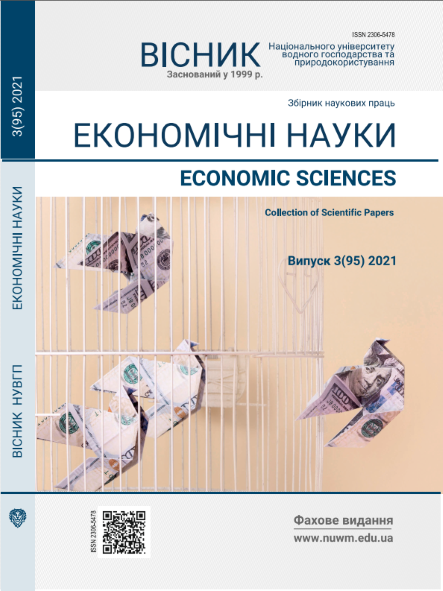FUEL ACCOUNTING ORGANIZATION AS A COMPONENT OF INFORMATION SUPPORT OF ENVIRONMENTAL TRACE MANAGEMENT
DOI:
https://doi.org/10.31713/ve3202110Keywords:
organization of accounting, fuel, information support, management, ecological footprint.Abstract
The article examines the identification of the organization of accounting, author's interpretation is offered. The organization of accounting is supposed to be a set of measures, actions and methods aimed at building, streamlining and improving the accounting system in order to exercise its control function over the rational use of resources and create a basis for the formation of reliable information, which is necessary for management.The stages of organizing the fuel accounting process as one of the main exhaustive and expensive resources for the operation of cars, which during combustion in the engine causes emissions of substances dangerous to human health and the environment, are defined.It is established that the generalization of information on the amount of fuel used is a necessary condition for assessing the level of pollutant emissions into the atmosphere, taking effective measures to reduce the level of anthropogenic impact on the environment, which in turn is reflected in the "environmental footprint". Forms of statistical reports, which contain information about fuel and volumes of its use are given. Relevant indicators of statistical reports are characterized. The content of the main pollutants in the air of Ukrainian cities according to the observations of hydrometeorological organizations is analyzed. The dynamics of pollutant emissions into the air of Ukraine for 2000-2010 is given. Thus, the analysis of the dynamics of pollutants in the air of Ukraine for 2000-2020 allows us to state that despite the positive dynamics to reduce emissions of harmful substances into the air, air pollution has a cumulative detrimental effect. Therefore, the environmental footprint of the activities of vehicles and equipment of all types of economic activity will deteriorate.Solving environmental problems in both the transport and industrial sectors of Ukraine will not only significantly reduce the man-made load on the environment, but also contribute to the preservation of unique natural and historical and cultural landscapes, while helping to reduce the level of ecological footprint.References
Качмар О. В. Теоретичні основи організації бухгалтерського обліку на підприємстві. Ефективна економіка. 2014. № 9. URL: http://www.economy.nayka.com.ua/?op=1&z=3367 (дата звернення: 28.08.2021).
Бондаренко Н. М. Теоретичні основи організації обліку на підприємстві. Науковий вісник Херсонського державного університету. 2014. № 4. С. 10-14.
Васільєва Л. М., Чепець О. Г. Поняття та основні передумови раціональної організації обліку. Інвестиції: практика та досвід. 2013. № 14. С. 31-33.
Фабіянська В. Сутність організації бухгалтерського обліку. Українська наука: минуле, сучасне, майбутнє. 2014. № 19. С. 214-222.
Гуцайлюк Л., Шулякова А. Організація обліку на підприємствах різних форм власності: стан та перспективи розвитку. Науковий вісник МНУ імені В. Сухомлинського. 2018. № 2 (11). С. 146-151.
Щодо паливно-мастильних матеріалів: лист Державного Комітету України з питань технічного регулювання та споживчої політики від 31.07.2009 р. № 7855-1-5/19. URL: https://zakon.rada.gov.ua/rada/show/v7855609-09?lang=uk#Text (дата звернення: 30.08.2021).
Податковий кодекс України: від 02.12.2010 р. № 2755-VI. URL: https://zakon.rada.gov.ua. (дата звернення: 30.08.2021).
Методичні рекомендації щодо облікової політики підприємства: наказ Міністерства фінансів України від 27.06.2013 р. № 635. URL: https://zakon.rada.gov.ua (дата звернення: 30.10.2021).
Крот Ю. Талони, смарт- та скретч-картки на пальне: що та як правильно застосовувати. Бюджетна бухгалтерія. 2015. № 41. URL: https://i.factor.ua/ukr/journals/bb/2015/november/issue-41/article-13063.html (дата звернення: 31.08.2021).
Норми витрат палива і мастильних матеріалів на автомобільному транспорті: затв. наказом Міністерства транспорту України від 10.02.1998 р. № 43. URL: https://zakon.rada.gov.ua/rada/show/v0043361-98#Text (дата звернення: 31.08.2021).
Екологічний слід. Вікіпедія. 2019. URL: https://uk.wikipedia.org/wiki/%D0%95%D0%BA%D0%BE%D0%BB%D0%BE%D0%B3%D1%96%D1%87%D0%BD%D0%B8%D0%B9_%D1%81%D0%BB%D1%96%D0%B4 (дата звернення: 28.08.2021).
Perkins S. The best way to reduce your carbon footprint is one the government isn’t telling you about. Science. 2017. URL: https://www.science.org/content/article/best-way-reduce-your-carbon-footprint-one-government-isn-t-telling-you-about (дата звернення: 28.08.2021).
Ripple W. J., Wolf C., Newsome T. M., Galetti M., Alamgir M., Crist E., Mahmoud M. I., Laurance W. F. World Scientists’ Warning to Humanity: A Second Notice. BioScience. 2017. No. 12. URL: https://doi.org/10.1093/biosci/bix125 (дата звернення: 28.08.2021).
Carrington D. Avoiding meat and dairy is ‘single biggest way’ to reduce your impact on Earth. The Guardian. 2018. URL: https://www.theguardian.com/environment/2018/may/31/avoiding-meat-and-dairy-is-single-biggest-way-to-reduce-your-impact-on-earth дата звернення: 28.08.2021).
Викиди від транспорту і як з ними боротися. Федерація роботодавців автомобільної галузі. 2020. URL: https://fra.org.ua/uk/an/publikatsii/analitika/vikidi-vid-transportu-i-iak-z-nimi-borotisia (дата звернення: 30.08.2021).
Павленко О. В. Актуальні питання забруднення атмосферного повітря. Державна екологічна інспекція України. 2021. URL: https://www.dei.gov.ua/posts/1563 (дата звернення: 30.08.2021).
Огляд стану забруднення навколишнього природного середовища на території України за І півріччя 2021 року (за даними спостережень Національної Гідрометслужби України). Центральна геофізична обсерваторія імені Бориса Срезневського. 2021. 19 с.
Економічна статистика. Навколишнє природне середовище. Державна служба статистики України. 2021. URL: http://www.ukrstat.gov.ua/operativ/menu/menu_u/ns.htm (дата звернення: 30.08.2021).

